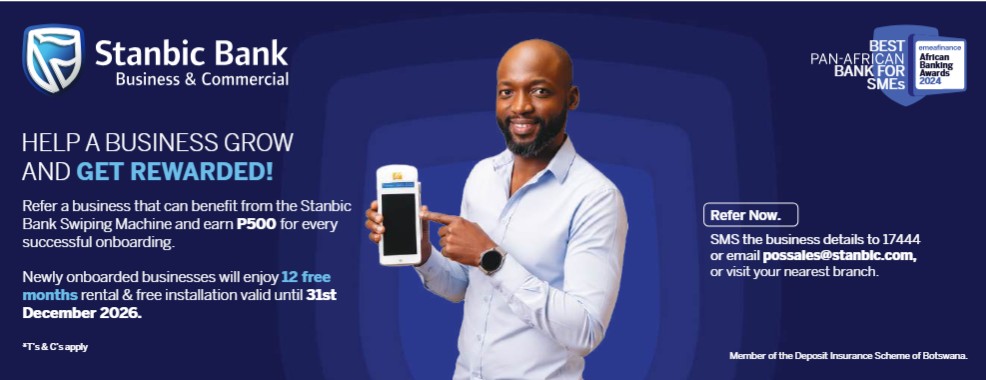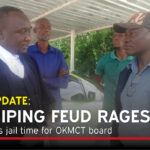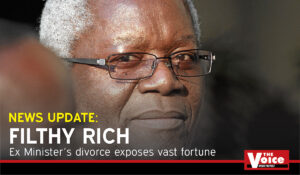Having spent over 24 years in the communications industry, spanning multiple sectors like insurance, mining, and finance, I have learned that the ever-evolving nature of our field demands agility, constant learning, and reflection.
Recently, I had an opportunity to introspect on Botswana’s journey towards its 2036 aspirations.
A critical insight from this reflection is the need to embrace a knowledge-based economy.
This means recognizing and compensating individuals for their expertise and skills, particularly when identifying strategic partners in communications and advertising.
In Botswana, we are seeing an emerging trend where agencies or consultants are invited via a request for tender to design and execute comprehensive awareness campaigns.
These tenders typically outline the requirements: preparing campaign products like publications, videos, and visibility materials, strategically placing them in media, and implementing all related activities.
However, clients often fall short of sharing their strategic vision, campaign objectives, milestones, and budget constraints which is understandable because the last thing you need is to share competitive information or information about your organization that is not public with a company that is yet to sign Non-disclosure agreements.
This could lead to you not being competitive because those you compete with will also have access to that information that you disclose to many parties at once.
Despite this, they expect a detailed strategy, detailed implementation plan, and detailed budgets from the service provider.
This practice poses significant challenges.
Seasoned professionals may resort to cut-and-paste solutions, but crafting a meaningful, detailed budget without a comprehensive understanding of the client’s needs is virtually impossible or not effective at all.
This approach undermines the effectiveness of our communication efforts and risks delivering subpar returns on investment.
Consequently, the industry may shift from personalized, impactful solutions to generic, template-based approaches driven solely by economic goals.
Passionate professionals either adapt to this trend or risk being sidelined, potentially diluting the quality of the industry.
Reflecting on these challenges, I considered how other industries handle similar situations.
Take architecture, for example.
When hiring an architect to design a new property, you wouldn’t float a tender asking them to outline their professional fees, project approach, and detailed construction costs before sharing your vision.
Instead, you would ask them to demonstrate their methodology, capabilities, and professional fees.
Once you’ve selected the preferred architect, you share your detailed vision, allowing them to create a bespoke solution tailored to your specific needs.
Imagine planning your dream home.
You wouldn’t just call several architects and ask them to submit their fees and building plans without providing them with a clear vision of what you want.
Instead, you would take the time to evaluate their previous work, understanding their design philosophy and approach to projects.
Only after choosing the architect who resonates most with your vision would you delve into the specifics of your dream home, ensuring that the design is uniquely tailored to your needs and preferences.
This meticulous and thoughtful approach is precisely what we need in the communications and advertising industry.
If we genuinely want to drive communications and marketing efforts to achieve the desired return on investment, we must adhere to practices that work.
Although we operate in a procurement-driven world, the procurement processes sensibly applied in hiring architects should consistently apply when hiring communications and advertising agencies.
As brands and businesses, it’s crucial to hire the best agency by conducting thorough background checks, requesting their professional fees, credentials, and methodology.
Providing a case study to test their ability to execute is also beneficial.
Once appointed, collaborate with the agency to develop a bespoke solutions, which will then inform the budget development process for implementation costs.
This approach not only ensures a solution that delivers the desired return on investment but also enhances brand perception—a win-win situation.
To achieve Botswana’s 2036 vision, we must acknowledge the value of expertise and strategically partner with those who can drive our communication and advertising efforts forward.
This shift will lead to more effective, personalized solutions, fostering an environment where our industry can thrive and contribute meaningfully to the nation’s growth.
Botswana’s Vision 2036 is a bold roadmap for transforming the country into a high-income, knowledge-based economy.
Achieving this vision requires a collective effort where every sector, including communications and advertising, plays a pivotal role.
As communicators, we have the power to shape perceptions, drive engagement, and influence behavior.
Therefore, our strategies must be grounded in a deep understanding of the local context and aligned with the national vision.
The next time you need to find an agency, consider this approach.
It might be the most important decision your organization makes regarding communications and advertising, and it deserves to be made with the right people with the appropriate knowledge.
Procurement-driven contracting can still work effectively as long as those who are responsible are intentional about the end goal.
Consider another industry parallel: the healthcare sector.
When seeking medical advice or treatment, patients don’t simply opt for the first available doctor.
Instead, they research, seek recommendations, and select a healthcare professional based on their expertise, experience, and ability to address specific health concerns.
Once chosen, the doctor and patient work collaboratively to develop a treatment plan tailored to the patient’s unique needs.
This collaborative approach ensures the best possible outcomes and builds a trusting, long-term relationship.
Similarly, in communications and advertising, the relationship between client and agency should be built on mutual respect, trust, and a shared vision.
By taking the time to select the right partner and working closely with them to develop bespoke solutions, businesses can ensure their campaigns are impactful and effective.
This collaborative approach not only enhances the likelihood of achieving desired outcomes but also fosters innovation and creativity, driving the industry forward.
We are all expected to do more with less, and in our view, if you get it absolutely correct at this stage, you will reap the rewards of your wisdom.
Ultimately, in your quest to grow your business and brand, you will improve Botswana.
Your company will grow, you will add value to employees and stakeholders, you will hire more people, and you will make a bigger social impact.
You will set your business and the nation in the right direction.
Take these decisions with that in mind.















